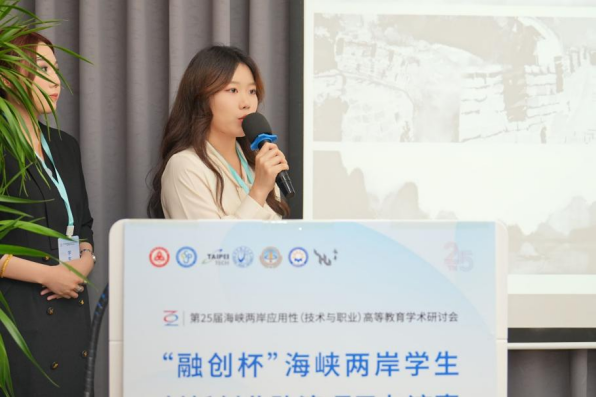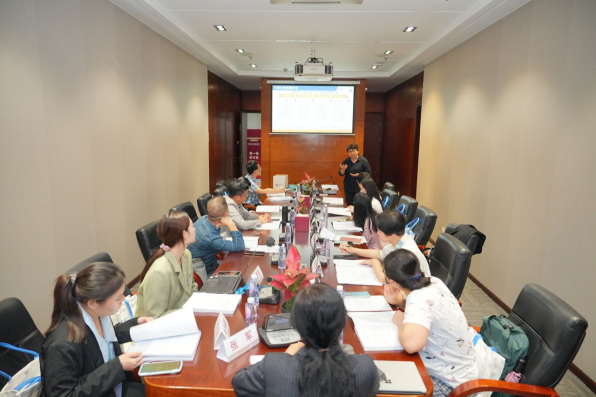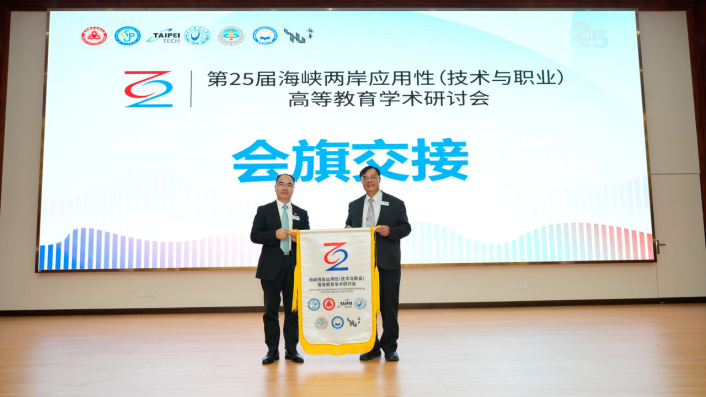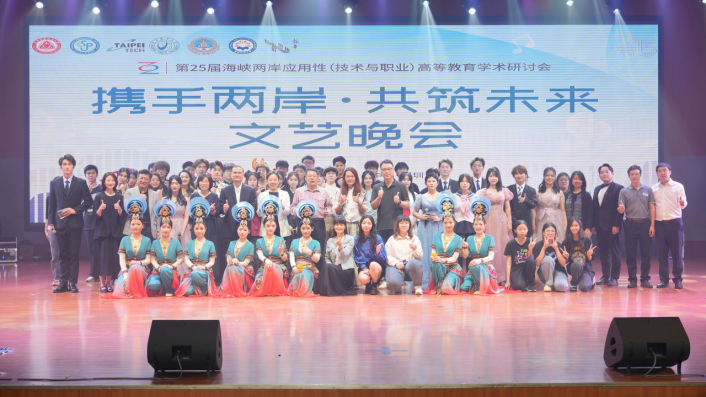
The seminar was held in Conference Room 1 of the Tongde Building.
The 25th Cross-Strait Applied (Technical and Vocational) Higher Education Academic Seminar (referred to as the "Cross-Strait Seminar") was held at Shenzhen Polytechnic University (SZPU) on November 14–15 in Conference Room 1 of the Tongde Building. This year’s seminar, themed “Digital · Green · Open · Innovative: Empowering Regional High-Quality Development through Higher Education”, brought together approximately 150 university presidents, experts, scholars, and student representatives from across the Taiwan Strait. Attendees engaged in in-depth discussions on talent cultivation models in higher education, coupling academic programs with regional industries, innovation and practice of integration models, building regional innovation systems, and driving industrial technological upgrades and transformations.
The Cross-Strait Seminar was jointly initiated in 1999 by Shenzhen Polytechnic University, Taipei University of Technology, Shanghai Polytechnic University, and Beijing Union University. In 2004, Chienkuo Technology University, Chaoyang University of Technology, and Lunghwa University of Science and Technology joined as co-organizers. The seminar is hosted annually on a rotational basis by universities across the Taiwan Strait and has successfully been held 24 times. According to the rotation system, this year’s Cross-Strait Seminar was hosted by Shenzhen Polytechnic University.
Over the past two decades, the seminar has been committed to enhancing exchanges and collaboration in vocational education between institutions across the Taiwan Strait, advancing the shared development of vocational education, fostering interaction and integration among students, and sharing successful experiences in higher vocational education. Today, the seminar has become an influential academic exchange platform in the field of higher vocational education, making significant contributions to the coordinated development of vocational education across the Strait.
Joining Hands to Open a New Chapter in Cross-Strait Educational Exchange
At the opening ceremony, Feng Wei, Deputy Director of the Guangdong Provincial Department of Education, delivered a video address for the seminar. He stated, “This seminar is not only a grand event in the field of technical and vocational education across the Taiwan Strait but also an important opportunity to deepen cross-strait exchanges and cooperation while advancing the shared development of higher education.” Feng emphasized that the department will continue to uphold the principle of “One Family Across the Strait” by building platforms for communication and collaboration and promoting the deep integration and development of vocational education across the Strait.
Wang Jue, Deputy Director of the Taiwan Affairs Office of the Shenzhen Municipal Government, highlighted in her speech that Shenzhen, as a frontier of China’s reform and opening-up, has always placed great importance on educational development, particularly in the reform and innovation of higher vocational education. She expressed three hopes for the seminar: 1. That educational colleagues from both sides of the Strait strengthen communication, share successful experiences, explore development paths, and jointly advance the prosperity of higher vocational education. 2.That young students from both sides actively participate in the seminar, foster interactions, and contribute their youthful energy to the great rejuvenation of the Chinese nation. 3.That the seminar keeps pace with the times, injecting new vitality and momentum into cross-strait educational cooperation.
Cai Maozhou, Chief Supervisor of the Shenzhen Municipal Education Bureau, stated that higher vocational education has provided strong talent and skills support for Shenzhen’s reform, opening-up, and local economic and social development. Shenzhen is advancing higher education with unprecedented determination, particularly by driving innovation in applied and vocational education reforms. Cai reaffirmed Shenzhen’s commitment to supporting innovative development in vocational education and expanding opportunities for cross-strait educational cooperation, expressing hope for deeper collaboration with Taiwanese peers to open a new chapter in educational exchanges.
Xu Jianling, Deputy Party Secretary and President of Shenzhen Polytechnic University, noted that in addition to keynote speeches and specialized forum discussions, this year’s Cross-Strait Seminar featured innovative events such as the "Sunac Cup" Cross-Strait Student Innovation and Entrepreneurship Friendship Competition, a dialogue salon between university presidents, entrepreneurs, and students, and a cultural evening titled “Joining Hands Across the Strait, Building the Future Together.” Xu emphasized that these activities not only provided a platform for faculty and students to showcase their talents and exchange ideas but also created valuable opportunities for mutual understanding and friendship between participants from both sides of the Strait.

The" Sunac Cup" Cross-Strait Student Innovation and Entrepreneurship Friendship Competition.
Experts Provide Insights to Chart New Directions for High-Quality Development in Vocational Education
What types of talent does industry need? How can universities better prepare students to meet these demands? What valuable lessons can be learned from the approaches of cross-strait universities in advancing industry-academia collaboration? These were among the key questions addressed during the keynote session of the seminar, where university presidents and industry leaders from both sides of the Taiwan Strait shared their perspectives on talent cultivation models and strategies for advancing regional industrial and technological transformation.
In the keynote session, Ge Zixiang, President of Lunghwa University of Science and Technology, delivered a speech titled “Seven Traits of Outstanding Talent Desired by Industry,” sharing his insights on the qualities that industry seeks in talent and the approaches universities can take to cultivate them. Chang Hongmei, Vice President of Beijing Union University, reflected on the institution’s journey toward becoming a comprehensive university and shared valuable experiences from their exploratory efforts. Jiang Jinshan, President of Chienkuo Technology University, focused on strategies for promoting low-carbon processes, applying green technologies, and cultivating carbon management talent in the "carbon-pricing era", emphasizing the pivotal role universities play in this transformation. Adding a corporate perspective, Zhu Dengchuan, Vice President of Han’s Laser Technology Industry Group, shared innovative practices developed through collaboration with Shenzhen Polytechnic University, highlighting breakthroughs in industry-academia integration and talent cultivation. Xie Huaqing, President of Shanghai Polytechnic University, addressed how universities can empower regional high-quality economic development, emphasizing the importance of benchmarking for quality, integrating industries and academia, and fostering innovation-driven growth. Meanwhile, Xu Songqi, Vice President of Chaoyang University of Technology, delivered a keynote titled “Higher Education and Promoting Rural Industrial Upgrades and Transformation,” offering strategies for revitalizing rural industries through educational initiatives. Lastly, Dang Zhangbo, Global Director of Huawei’s Enterprise Training and Certification Department, shared his insights on the development trends of intelligent computing talent and how universities can align their efforts with these emerging demands.
In the digital and intelligent era, characterized by innovations such as Apollo Go, dark factories, and digital educators, smart scenarios are emerging at an unprecedented pace. As artificial intelligence reshapes industries, enterprises, and employment, higher vocational education must better navigate the paths of industrial transformation, business innovation, and technological advancement. Xu Jianling, President of Shenzhen Polytechnic University, shared SZPU's practical efforts in delivering high-quality education from the perspective of school-enterprise collaboration in the digital and intelligent age. He emphasized that cultivating high-quality digital intelligence talent must be rooted in a deep understanding of industry needs. For instance, SZPU’s partnership with Huawei integrates an enterprise perspective to reimagine the transformation of talent development in the digital age. By focusing on Huawei’s foundational technologies, the university has built a skill and knowledge system aligned with the characteristics of the digital industry, developed a comprehensive curriculum for emerging technologies, and trained high-skilled talent, while exploring pathways for reforming and advancing China’s vocational education.
Additionally, this year’s Cross-Strait Seminar featured specialized forums, where 12 paper authors presented their research topics. These sessions provided a platform for intellectual exchange, sparking innovative ideas in vocational education across the Taiwan Strait.

Specialized Forum Discussions in Progress.
Youth Exchange: Building Bridges of Friendship and Mutual Learning for Cross-Strait Students
To encourage creativity, practical application, and entrepreneurial energy among students from both sides of the Taiwan Strait, the seminar featured the " Sunac Cup" Cross-Strait Student Innovation and Entrepreneurship Friendship Competition. After fierce competition, awards were presented in six categories: Best Innovation, Best Business Design, Best Product Design, Best Team Collaboration, Best Social Contribution, and Best Presentation.
As an integral part of the seminar, the dialogue salon brought together university presidents, entrepreneurs, and students to discuss innovative and practical models of integrating vocational education with industry needs. Participants included Yu Tao, President of Shanghai University of Engineering Science; Wang Hui, President of Shenzhen Institute of Information Technology; Liu Binglin, Vice President of Chienkuo Technology University; Lin Chuxiong, Vice President of Wenzao Ursuline University of Languages; Wan Yuwen, Vice President of Nanning Vocational and Technical College; and Hu Liangsheng, Chairman of the Youth Committee of the Shenzhen Taiwanese Business Association. Each shared insights on talent cultivation and industrial transformation, engaging in genuine and thought-provoking dialogue with students.
"How should traditional vocational education programs respond to the challenges brought by AI development?" "Many teachers are incorporating MOOCs in their classes; what successful cases and experiences can be shared by both sides in building smart campuses and online education platforms?" "What is the current state and future direction of cultural and student exchanges in cross-strait vocational education?" After listening to the university presidents and entrepreneurs, the students actively raised these and other questions, focusing on the unique characteristics of cross-strait vocational education and future employment prospects, engaging eagerly in discussions and seeking guidance from the experts.

SZPU Hands Over the Banner to Chienkuo Technology University
At the closing ceremony of the Cross-Strait Seminar, an award ceremony for the " SUNAC Cup" Cross-Strait Student Innovation and Entrepreneurship Friendship Competition was held. Chienkuo Technology University, which will host the next seminar, received the ceremonial banner from Shenzhen Polytechnic University. Jiang Jinshan, President of Chienkuo Technology University, delivered a speech during the handover ceremony.

"Joining Hands Across the Strait, Building the Future Together" Cultural Evening
From its beginnings with four founding universities to the current rotation among seven institutions, the Cross-Strait Seminar has involved over 7,000 faculty and students from universities on both sides of the Taiwan Strait. Over the past 25 years, cross-strait vocational institutions have used this seminar to align with contemporary themes, conduct regular activities and exchanges, and foster in-depth interactions between experts and scholars. The seminar has played a pivotal role in deepening cross-strait higher vocational education exchanges, expanding the scope of collaboration, and enhancing the quality of engagement. It has also increased the benefits and sense of achievement for faculty and students from both sides. By injecting strong momentum into the development of cross-strait higher vocational education, the seminar has become a driving force for mutual progress.
(Office of Hong Kong, Macao, and Taiwan Affairs)
 School Motto:
School Motto:
 Search
Search
 School Motto:
School Motto:
 Search
Search